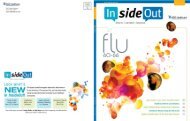media - ASD Healthcare
media - ASD Healthcare
media - ASD Healthcare
You also want an ePaper? Increase the reach of your titles
YUMPU automatically turns print PDFs into web optimized ePapers that Google loves.
HyperRHO® S/DFull DoseRho(D) Immune Globulin (Human)Solvent /Detergent TreatedBRIEF SUMMARYCONSULT PACKAGE INSERT FOR FULL PRESCRIBINGINFORMATIONFOR INTRAMUSCULAR INJECTION ONLYINDICATIONS AND USAGEPregnancy and Other Obstetric ConditionsRho(D) Immune Globulin (Human) — HyperRHO® S/D Full Doseis recommended for the prevention of Rh hemolytic disease of thenewborn by its administration to the Rho(D) negative mother within72 hours after birth of an Rho(D) positive infant, providing thefollowing criteria are met:1. The mother must be Rho(D) negative and must not already besensitized to the Rho(D) factor.2. Her child must be Rho(D) positive, and should have a negativedirect antiglobulin test (see PRECAUTIONS).If HyperRHO S/D Full Dose is administered antepartum, it isessential that the mother receive another dose of HyperRHO S/DFull Dose after delivery of an Rho(D) positive infant.If the father can be determined to be Rho(D) negative,HyperRHO S/D Full Dose need not be given.HyperRHO S/D Full Dose should be administered within 72 hoursto all nonimmunized Rho(D) negative women who have undergonespontaneous or induced abortion, follow ing ruptured tubalpregnancy, amniocentesis or abdominal trauma unless the bloodgroup of the fetus or the father is known to be Rho(D) negative. Ifthe fetal blood group cannot be determined, one must assumethat it is Rho(D) positive, and HyperRHO S/D Full Dose should beadministered to the mother.TransfusionHyperRHO S/D Full Dose may be used to prevent isoimmuni -zation in Rho(D) negative individuals who have been transfusedwith Rho(D) positive red blood cells or blood componentscontaining red blood cells.CONTRAINDICATIONSNone known.WARNINGSHyperRHO S/D Full Dose is made from human plasma.Products made from human plasma may contain infectiousagents, such as viruses, and, theoretically, the Creutzfeldt-Jakob Disease (CJD) agent that can cause disease. The riskthat such products will transmit an infectious agent has beenreduced by screening plasma donors for prior exposure tocertain viruses, by testing for the presence of certain currentvirus infections, and by inactivating and/or removing certainviruses. Despite these measures, such products can stillpotentially transmit disease. There is also the possibility thatunknown infectious agents may be present in such products.Individuals who receive infusions of blood or plasma productsmay develop signs and/or symptoms of some viral infections,particularly hepatitis C. ALL infections thought by a physicianpossibly to have been transmitted by this product should bereported by the physician or other healthcare provider toGrifols Therapeutics Inc. [1-800-520-2807].The physician should discuss the risks and benefits of thisproduct with the patient, before prescribing or administering itto the patient.NEVER ADMINISTER HYPERRHO S/D FULL DOSEINTRAVENOUSLY. INJECT ONLY INTRAMUSCULARLY. NEVERADMINISTER TO THE NEONATE.Rho(D) Immune Globulin (Human) should be given with caution topatients with a history of prior systemic allergic reactions followingthe administration of human immunoglobulin preparations.The attending physician who wishes to administer Rho(D)Immune Globulin (Human) to persons with isolated immuno -globulin A (IgA) deficiency must weigh the benefits of immuni -zation against the potential risks of hypersensitivity reactions.Such persons have increased potential for developing antibodiesto IgA and could have anaphylactic reactions to subsequentadministration of blood products that contain IgA.As with all preparations administered by the intramuscular route,bleeding complications may be encountered in patients withthrombocytopenia or other bleeding disorders.PRECAUTIONSGeneralA large fetomaternal hemorrhage late in pregnancy or followingdelivery may cause a weak mixed field positive D u test result. Ifthere is any doubt about the mother’s Rh type, she should begiven Rho(D) Immune Globulin (Human). A screening test todetect fetal red blood cells may be helpful in such cases.If more than 15 mL of D-positive fetal red blood cells are presentin the mother’s circulation, more than a single dose ofHyperRHO S/D Full Dose is required. Failure to recognize thismay result in the administration of an inadequate dose.Although systemic reactions to human immunoglobulinpreparations are rare, epinephrine should be available fortreatment of acute anaphylactic reactions.Drug InteractionsOther antibodies in the Rho(D) Immune Globulin (Human)preparation may interfere with the response to live vaccines suchas measles, mumps, polio or rubella. Therefore, immunizationwith live vaccines should not be given within 3 months afterRho(D) Immune Globulin (Human) administration.Drug/Laboratory InteractionsBabies born of women given Rho(D) Immune Globulin (Human)ante partum may have a weakly positive direct antiglobulin test atbirth.Passively acquired anti-Rho(D) may be detected in maternalserum if antibody screening tests are performed subsequent toantepartum or postpartum administration of Rho(D) ImmuneGlobulin (Human).Pregnancy Category CAnimal reproduction studies have not been conducted withHyperRHO S/D Full Dose. It is also not known whetherHyperRHO S/D Full Dose can cause fetal harm whenadministered to a pregnant woman or can affect reproductioncapacity. HyperRHO S/D Full Dose should be given to a pregnantwoman only if clearly needed.Pediatric UseSafety and effectiveness in the pediatric population have not beenestablished.ADVERSE REACTIONSReactions to Rho(D) Immune Globulin (Human) are infrequent inRho(D) negative individuals and consist primarily of slightsoreness at the site of injection and slight temperature elevation.While sensitization to repeated injections of human immuneglobulin is extremely rare, it has occurred. Elevated bilirubin levelshave been reported in some individuals receiving multiple dosesof Rho(D) Immune Globulin (Human) following mismatchedtransfusions. This is believed to be due to a relatively rapid rate offoreign red cell destruction.Grifols Therapeutics Inc.Research Triangle Park, NC 27709 USAU.S. License No. 187108941119-BS






